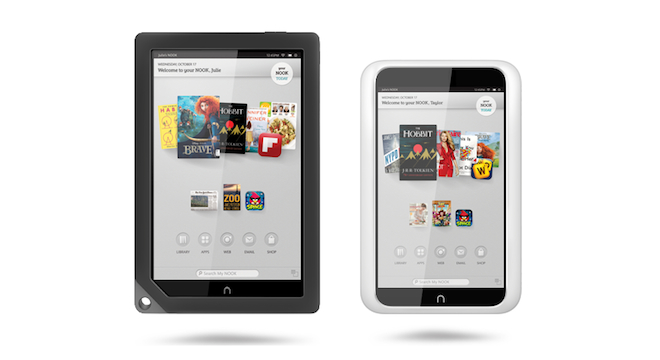Like clockwork, Barnes & Noble on Wednesday unveiled its latest tablet offerings, the Nook HD and Nook HD+, Android-based devices that seem poised to again compete with Amazon’s just-relit Kindle Fire line more than Apple’s iPad or any other tablet challengers out there.
The Nook HD is a 7-inch tablet with a display that Barnes & Noble claims is “the world’s highest-resolution ever on a 7-inch tablet,” at 1440 x 900 pixels (compared to the 1280 x 800 pixel resolution found on Amazon’s comparably-sized Kindle Fire HD the Asus/Google Nexus 7 tablet).
The Nook HD also retails for $199, the same price as the Amazon Kindle Fire HD 7-inch and the Asus/Google Nexus 7, the devices to which it is most analogous.
But it’s the 9-inch Nook HD+ that comes in at a cheaper price than the similar-positioned Kindle Fire HD 8.9-inch, $269 compared to Amazon’s $299.
Barnes & Noble said the devices won’t ship until late October and won’t be available in stores until early November, dates a spokesperson declined to specify any further when asked by TPM.
But already, the struggling bookseller is taking pre-orders for the devices on its website and, again following Amazon, has expanding the availability of the new and older models to the UK, where it doesn’t actually have any physical retail outlets — traditionally seen as one of the company’s few major strengths over Amazon.
Instead, in the UK, Barnes & Noble has partnered with “more than 1,600 top high street retailers including John Lewis, Argos, Sainsbury’s, Dixons and Waitrose, and Britain’s leading bookshops, Blackwell’s and Foyles,” and will also sell the devices online, the company said.
Still, Barnes & Noble, with its new tablets bowing just two and a half weeks following Amazon’s new Kindle lineup, couldn’t resist going after both Apple and Amazon in its marketing materials for the new Nooks.
As a Barnes & Noble press release read:
“Starting at the low prices of $199 for NOOK HD and $269 for NOOK HD+, nearly half the cost of the leading large-format tablet, both products deliver an amazing value for customers, with no annoying ads.”
The “half the cost” jab was clearly aimed at the $499 brand-new iPad starting price, while the mention of “no annoying ads” was an apparent reference to Amazon’s decision to originally unveil its new Kindle Fire models with no way to opt-out of lock screen ads, contrary to its previous policy of charging more upfront for display ad-free versions.
Barnes & Nobles’ remark was a bit of a misfire though, given that Amazon sharply reversed course and began allowing buyers to pay just $15 for an ad-free version.
But the clearest indication that Barnes & Noble is seriously considering challenging Amazon’s self-declared (and analyst supported) dominance over the Android tablet market in the U.S. is the launch of the new Nook Video online store.
Nook Video, which will come to both the U.S. and the U.K., will offer Nook owners streaming or downloadable video, a strategy that seems on its face markedly close to Amazon’s own Instant Video service with Unbox player.
In the U.S., it’s also allowing them to automatically add digital copies of any physical DVDs or Blu-Rays they already own or purchase later, so long as those movies have an “Ultraviolet” stamp on them.
The real test for Nook Video is whether it can come anywhere close to the sheer number of titles that Amazon offers (over 120,000 at this article’s initial publication).
Barnes & Noble is playing coy on that front though, with a spokesperson telling TPM the company will “have a broad assortment of popular movies and TV shows.”
In the U.S., Barnes & Noble says it’s secured content partnerships with HBO, STARZ, Disney Studios and Warner Brothers, and apparently AMC, as it’s already advertising “Breaking Bad” and “The Walking Dead,” being available when the service rolls out around the new Nooks’ ship date.
Barnes & Noble’s video announcement for the UK was markedly briefer, simply promising users “their favourite standard and HD movies and TV shows.”
But in both markets, Barnes & Noble wants to be able to provide video on devices outside of its Nooks, on competitors’ devices, another Amazon-like move.
It’s fairly likely that at least two of the competing app stores — Apple App Store, Amazon App Store and Google Play — will accept Barnes & Noble’s Nook Video app, given that Barnes & Noble has already managed to get a Nook reader app on them. As Barnes & Noble’s press release said: “content can also be viewed on NOOK devices, TVs, smartphones and tablets via a suite of new free NOOK Video apps.”
There’s no such advertisement in the Nook HD U.K. release, but Nook apps for Apple devices are advertised Barnes & Noble’s UK site.
Amazon’s Appstore for Android doesn’t offer a Nook reader app and won’t likely see Nook Video, either.
Perhaps the most interesting aspect of the unveiling of the new nooks is what Barnes & Noble didn’t say: It made little mention of its earlier stated idea to spin-off the Nook business entirely as a separate entity, plans which seemed to be closer to fruition after the company in April announced a joint-venture with Microsoft and a new generic name, “Newco,” for the two firms’ combined digital book, content and tablet business.
In fact, the only mention of these machinations was in a disclosure form at the bottom of the Nook HD press release, where Barnes & Noble warned among its business risks were “the risk that the transactions contemplated by the partnership with Microsoft to form Newco, including with respect to any spin-off, split-off or other disposition by Barnes & Noble of its interest in Newco, are not able to be implemented on the terms contemplated or at all.”
TPM has reached out to Barnes & Noble for more details and will update when we receive them.






